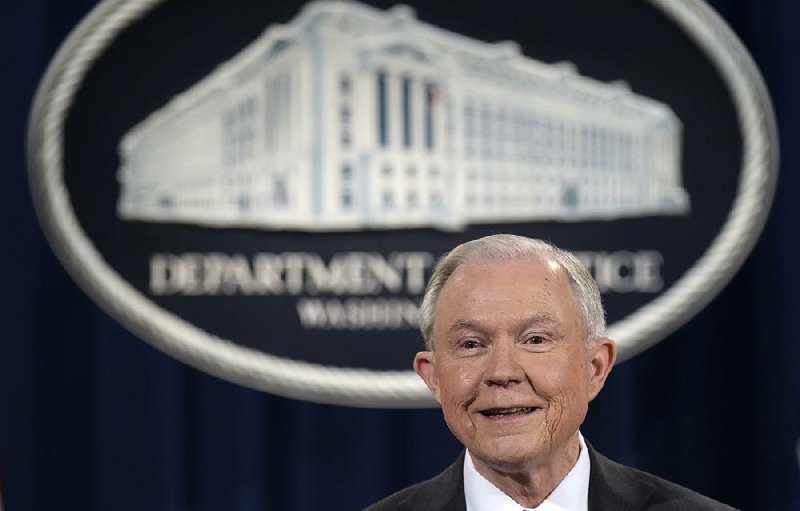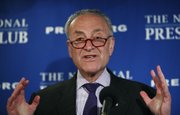MOSCOW -- As ferment regarding Attorney General Jeff Sessions plays out in Washington, the Kremlin is watching, with a mixture of frustration and regret, how developments are blocking progress on pressing issues on the U.S.-Russian agenda.
Despite hopes for a quick thaw, however, Russia is voicing its readiness to wait as long as it takes.
President Donald Trump had taken office expressing admiration for Russian President Vladimir Putin and hoping to mend ties with Russia, which have sunk to the lowest point since the Cold War over the Ukrainian crisis, the war in Syria and other disputes.
In a conference call with reporters, Putin's spokesman Dmitry Peskov lamented the lack of cooperation with the U.S. on Syria beyond the U.S. diplomatic presence at peace talks in Kazakhstan's capital of Astana that Russia and Turkey brokered earlier this year.
"Similarly, there has been no movement forward regarding cooperation in the fight against terrorism, which causes regret," he said.
[PRESIDENT TRUMP: Timeline, appointments, executive orders + guide to actions in first 100 days]
Trump has repeatedly talked of cooperating with Russia in fighting the Islamic State extremist group in Syria. The administration of former President Barack Obama had ruled out such cooperation because of Russia's support for its longtime ally, Syrian President Bashar Assad.
"Without waiting for these contacts to start, Russia has been consistently contributing to the fight against terrorism and scoring results," Peskov said, pointing to the Russian military's role in driving the Islamic State group from the historic Syrian town of Palmyra.
For now, the Kremlin is trying to show patience.
Peskov sought to play down Trump's proposal to raise military spending by 9 percent, saying that's a domestic matter for Washington. "It would hardly concern us until a rise in spending upsets the existing balance of strategic deterrence," he said.
Asked to comment on the developments on Sessions, Peskov cited Trump's description of it as "a total witch hunt" and added: "We have nothing to add to the expansive definition given by President Trump."
Sessions recused himself Thursday from any investigation into communications between Trump aides and Russia after revelations arose that, as a senator, Sessions twice spoke with Ambassador Sergey Kislyak during the 2016 election campaign and failed to say so when pressed by Congress.
Sessions said he had not tried to mislead anyone but could have been more careful in his answers. He plans to file amended testimony on Monday, a Justice Department spokesman said.
Sessions was an early backer of Trump's bid for the presidency and served as an adviser and surrogate for the campaign.
Russian Foreign Minister Sergey Lavrov argued that contacts with officials and lawmakers are part of any ambassador's duties. He added that the pressure on Sessions "strongly resembles a witch hunt or the times of McCarthyism, which we thought were long over in the United States as a civilized country."
In the 1950s, Sen. Joseph McCarthy led a hunt for purported communist infiltrators in the U.S. government, often involving unfounded accusations that promoted widespread fear.
Noting Russia won't mimic the U.S., Lavrov added that "if we applied the same principle to Ambassador [John] Tefft's activities in Russia and his contacts, it would have made quite a funny picture."
Two prominent daily newspapers, Moskovsky Komsomolets and Nezavisimaya Gazeta, featured commentary that cited anti-Russian hysteria in the United States as a primary source of the drive to oust national security adviser Michael Flynn and force Sessions to recuse himself.
Maria Zakharova, spokesman for Russia's Foreign Ministry, characterized reporting on Trump this way: "Is this rock bottom? Or can they go even lower."
In Washington, Trump's warm words for Putin, his half-joking call for Russia to hack into Hillary Clinton's emails, and the revelation that Flynn discussed U.S. sanctions against Russia with Kislyak before Trump took office have raised concerns. Trump and his administration have resisted accepting the U.S. intelligence community's conclusion that Russia was attempting to help him win the election; Sessions in an interview with Fox News on Thursday refused to acknowledge that Russia favored Trump over Clinton.
Deputy Foreign Minister Sergei Ryabkov deplored that Russia has become a tool in the U.S. political struggle.
"Regrettably, influential forces in the U.S. are using relations with Russia as an instrument for achieving certain goals or treating our relations as a collateral damage in their internal fighting," he said in remarks carried by Russian news agencies. "It causes a strong regret, but we aren't making a tragedy out of it."
Ryabkov added that Russia continues to believe that restoring ties "destroyed by Obama's administration" is a daunting but still achievable goal.
"We will work on it on such a pace, with such intensity and succession of steps that would be comfortable for the American side," he said. "We aren't going to artificially rush any processes. We realize that it will take certain time for the current U.S. administration to make all key appointments and determine its policy priorities, including on the Russian track."
Ryabkov and Tefft met Friday in Moscow to discuss "bilateral issues," the Russian Foreign Ministry said in a statement.
Political Jabs
Trump, meanwhile, issued a call for "an immediate investigation" into Senate Minority Leader Charles Schumer's own "ties to Russia and Putin," tweeting a photo of the New York Democrat at an event with the Russian president in New York in 2003. The photo shows the two with doughnuts in their hands.
The president called Schumer a "total hypocrite!"
Schumer responded on Twitter a short time later, writing that he would "happily talk" under oath about his meeting with Putin, which took place "in full view of press and public."
He then challenged Trump to do the same.
Schumer later tweeted, "And for the record, they were Krispy Kreme donuts."
Thursday's recusal by Sessions did little to assuage demands from some Democrats that the investigation be removed entirely from the Justice Department and given to an outside prosecutor.
Rep. Adam Schiff of California, the top Democrat on the House Intelligence Committee, called the recusal "deeply inadequate" and said he was troubled by the number of Trump associates who he contended have either made misleading statements or concealed communications with Russia.
"I also think for the public to have confidence that any prosecutorial decision is made truly independent of the administration, that the extra remedy of a special counsel is really warranted here," Schiff said in an interview.
There is precedent for the selection of a special counsel by the Justice Department for especially sensitive investigations, though there's no indication yet that federal officials are planning to seek such an appointment.
But with Sessions recused from any investigation, focus has turned to Rod Rosenstein, a veteran prosecutor in line for deputy attorney general.
Rosenstein, who faces his confirmation hearing next week, was appointed top federal prosecutor in Maryland by President George W. Bush and remained in the post for the entire Obama administration.
"He is so well-respected. He cannot be influenced, he cannot be bought, he cannot be pressured because of outside political forces," said Baltimore criminal defense attorney Steven Silverman, who has known Rosenstein for years.
Sessions' recusal handed authority for an investigation to his current deputy, Dana Boente, another longtime federal prosecutor who has the post in an acting capacity. Boente was appointed U.S. attorney for the Eastern District of Virginia in 2015 by Obama and was elevated to acting attorney general in January after Trump fired Obama holdover Sally Yates. When Sessions won confirmation, Boente stepped to the No. 2 position.
Once Rosenstein is confirmed, he'll take over responsibility for any investigations touching the Trump campaign and Russian meddling.
He arrives at the Justice Department with experience in politically freighted investigations, having earlier in his career been part of the Bill Clinton-era Whitewater independent investigation.
Information for this article was contributed by Vladimir Isachenkov, Eric Tucker and staff members of The Associated Press; by David Filipov of The Washington Post; and by Ilya Arkhipov of Bloomberg News.
A Section on 03/04/2017

